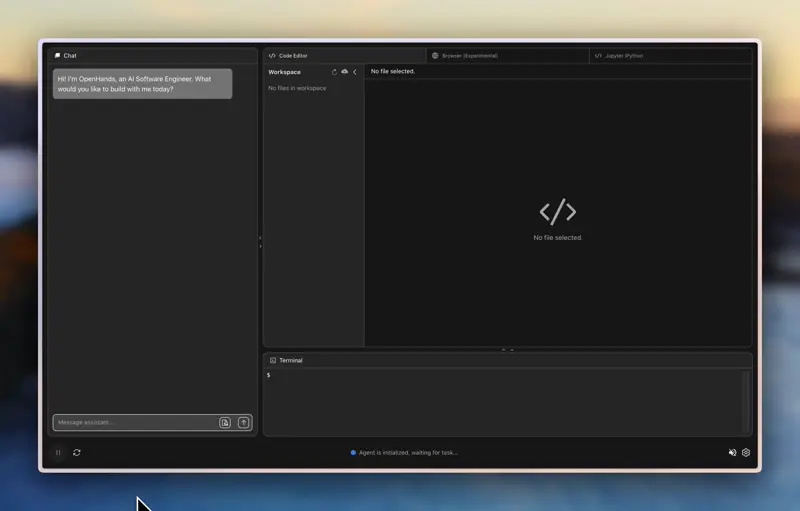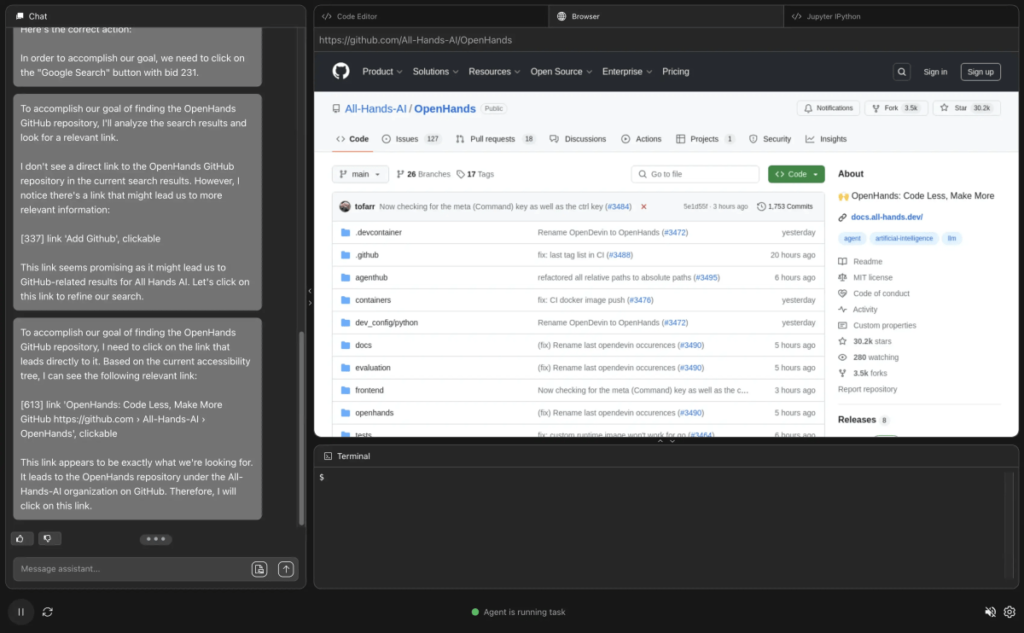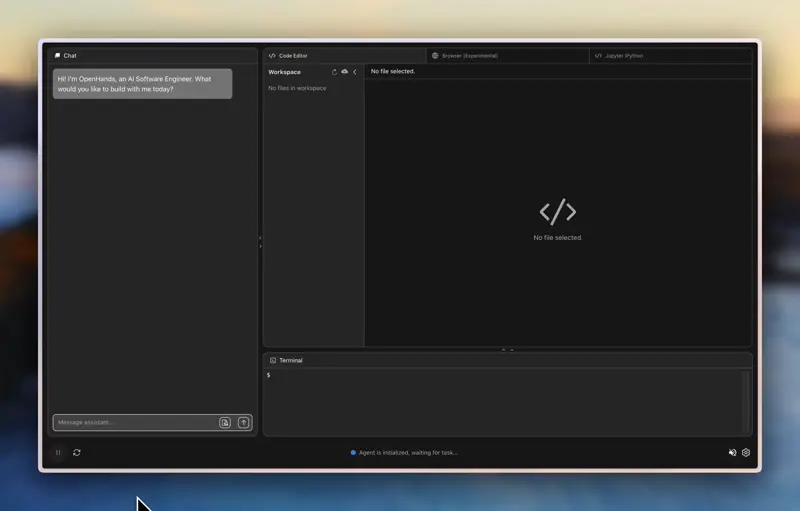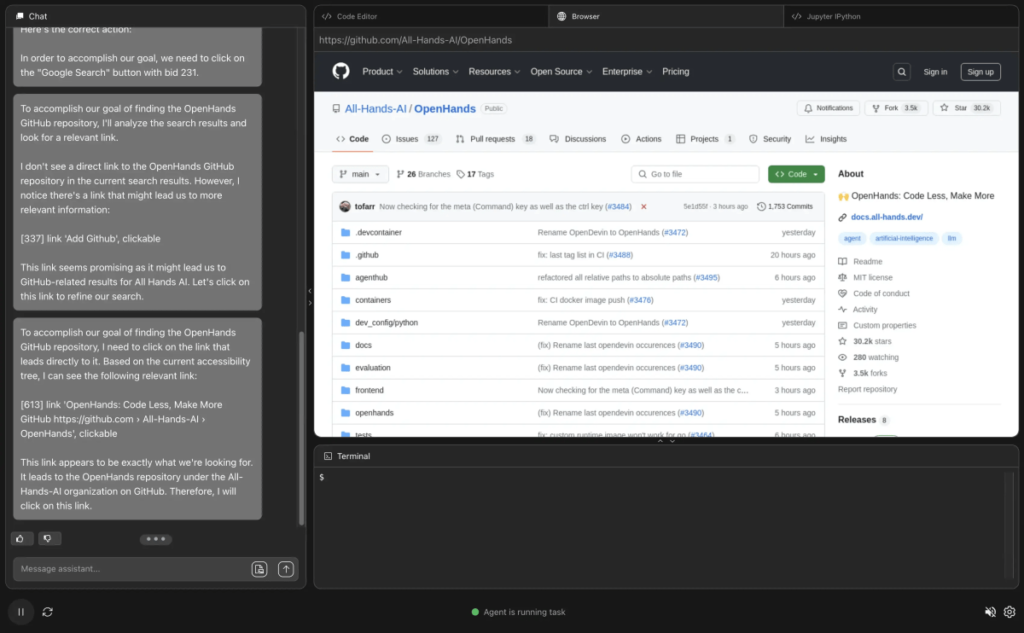Programming, at its core, is often celebrated as a highly creative endeavor. Developers engage in problem-solving, design system architectures, and write algorithms to bring innovative ideas to life. The process of transforming concepts into functional applications or products involves a blend of artistry and technical expertise, making it one of the most fulfilling aspects of a developer’s work. Whether it’s crafting intuitive user interfaces, optimizing back-end processes, or designing a new feature from scratch, programming can often feel like a form of digital craftsmanship. This is the creative side that draws many to the field — the chance to build something unique, solve complex problems, and contribute to the evolution of technology.
All Hands AI, which recently secured $5 million in seed funding led by Menlo Ventures, is focused on developing model-agnostic, open-source AI agents designed to manage routine tasks. This will enable developers to dedicate more time to high-value, creative work.

AI Cognition recently introduced Devin, an AI agent capable of executing complex engineering tasks and building and deploying applications end-to-end.
In an interview prior to Thursday’s announcement, Brennan remarked, “The release of the Devin demonstration by Cognition garnered widespread attention and, like many software engineers, I found it impressive. It sparked a collective vision of what the future of software development might entail. However, it also raised concerns due to its closed-source nature, creating a restricted environment that limits transparency, collaboration, and ownership within the broader development community.”
What began earlier this year as a simple text file on GitHub under the name OpenDevin has rapidly evolved into OpenHands, an open-source project now boasting over 30,000 stars and more than 150 contributors. The vision behind OpenHands is to create an AI-powered agent that acts as a proactive pair programmer, working seamlessly alongside developers. This intelligent agent would not only handle routine tasks like writing tests and deploying applications but also anticipate changes in code. For instance, if the name of a function is altered, the agent would recognize the potential ripple effects across the application and prompt the developer to make necessary adjustments. By automating these time-consuming tasks, OpenHands empowers developers to focus on more strategic, creative work.

Joff Redfern, a partner at Menlo Ventures and former chief product officer at Atlassian, stated, “AI will fundamentally transform the way developers operate. However, it will not alter their strong preference for open-source solutions, particularly in areas that directly impact their daily workflows. By adopting an open-source approach, All Hands is facilitating the software engineering community’s progress toward achieving an optimal AI-driven development environment.”

Brennan and his two co-founders, Xingyao Wang (chief AI officer) and Graham Neubig (chief scientist), bring an extraordinary depth of expertise in natural language processing and AI agent development. Brennan’s impressive career includes pioneering work on document summarization at Google, followed by leadership roles at several cutting-edge startups, where he spearheaded revolutionary machine learning and infrastructure projects. Neubig, a renowned associate professor at Carnegie Mellon, is a leading authority in natural language processing, with groundbreaking contributions to the field. Wang, an AI prodigy, has temporarily paused his prestigious doctorate at the University of Illinois Urbana-Champaign, where his research into interactive language agents powered by advanced foundation models has already made waves in the academic community. Together, this trio represents a formidable force in the AI landscape.
“We weren’t surprised by the technology in the Cognition demo,” Brennan said. “We knew it was possible, but seeing it integrated into a user experience inspired us to start building it as an open-source project.”
Brennan noted that while tools like Copilot are valuable for developers, they do not yet encompass the entire “agentic loop of coding,” similar to a self-driving car. This is the aspiration of All Hands AI, though it remains somewhat aspirational at present. Currently, it is not feasible to entrust an agent with a company’s entire JIRA backlog and expect it to handle all tasks autonomously. Brennan, reflecting a common industry perspective, believes that human developers will continue to play a crucial role for the foreseeable future.

There remain unresolved questions regarding the optimal user and developer experience for such systems. All Hands AI employs a designer to address these issues from an early stage, which is a promising development. At present, the user experience is somewhat disconnected from the development environment; however, the team intends to integrate with VS Code and other code editors in the near future.
As with many open-source startups, All Hands AI intends to monetize its service by introducing paid, closed-source features for enterprises. Brennan emphasized, “We believe we can develop software that not only complements our open-source offerings but also delivers substantial value to large enterprises. This approach allows us to maintain a sustainable open-source project by ensuring it receives financial support from these enterprises, while also justifying the decision to keep certain aspects closed-source.”
With this initial funding round, the team aims to expand its technology stack before focusing on monetization. Alongside Menlo Ventures, the round included Pillar VC, Betaworks, and Rebellion, and attracted angel investors such as Thom Wolf (Hugging Face co-founder), Jeff Hammerbacher (Cloudera co-founder), and Soumith Chintala (PyTorch creator and Meta VP).

